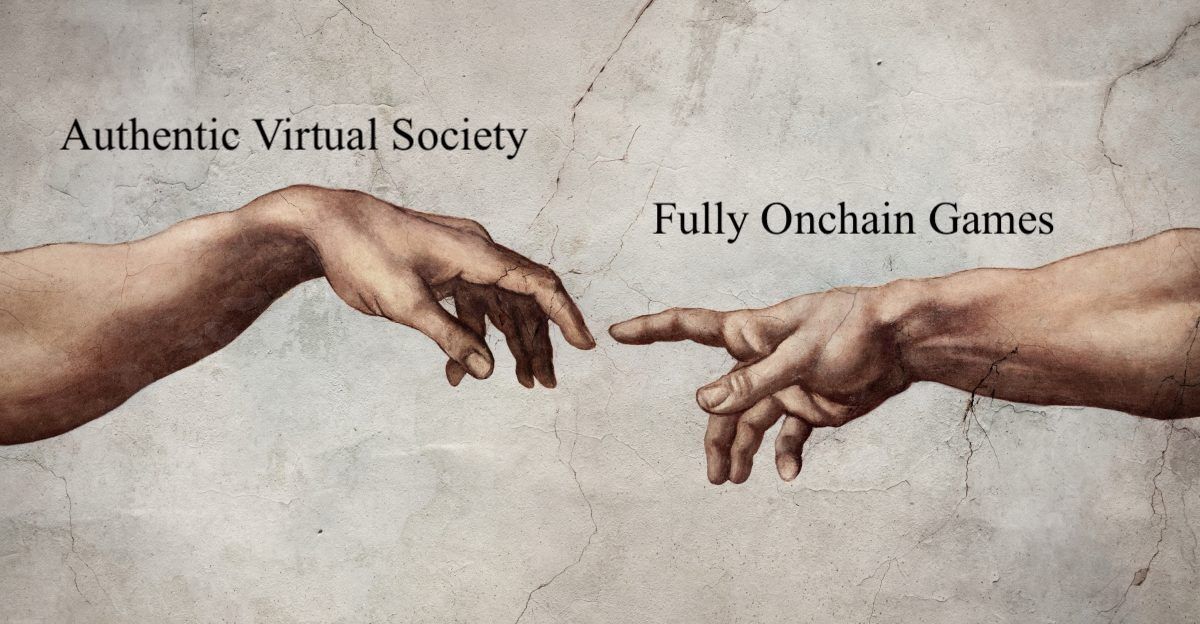A Guide to Authentic Virtual Society

By Modeo
Digital Transformation of Human Society
The digitization of society represents more than just a technological trend; it is a profound shift that is altering how we engage with each other. Platforms like Uber and Upwork have redefined labor and service exchanges, and through this digitization, we now enter into many implicit social contracts with one another on a daily basis - whether it’s trusting a stranger to drive you home, or contracting a freelancer on Upwork.

The gaming industry embodies these advancements. The virtual world is becoming a microcosm that mirrors and perhaps anticipates broader trends in our increasingly digitized society. Early popular online games like CS:GO place an emphasis on direct competition between individual players. This approach resonated with the essence of gaming's straightforward, combative spirit. Victory was single dimensional, and winning meant mastering control and outmaneuvering opponents.
As technology advances, game designers are expanding their digital toolkit, allowing players to compete across a far more multidimensional set of challenges. Designers are introducing concepts like clans and virtual organizations in strategy games, fostering a new era of collaborative competition. We find ourselves waking up in the middle of the night to coordinate synchronized attacks on rival factions. Games have evolved into something far more nuanced and social, a microcosm of teamwork, strategy, and virtual society building.
What Authentic Relationships Entail
However, despite these advancements, games still fall short in mimicking the sophisticated social dynamics present in our everyday societies. The disparity lies in the virtual realms' failure to replicate authentic relationships that are influenced and shaped by legal or authoritative measures.
Relationships are built on honor and commitment, and backed by authorities. Individuals bear consequences for each other. They exhibit flexibility, allowing people to form connections that are both meaningful and binding within or outside of their social group like marriage or forming corporate entities . Relationships also allow participants to negotiate and exit at will.
People also implicitly enter into many temporal agreements, like joining an Uber ride protected by commercial insurance and statewide regulations. These real-world examples highlight the complexity and subtlety of genuine relationships that are hardly present in the virtual realm.
Missing Frameworks for Authentic Relationships

Modern MMO/4x-strategy games often confine players within rigid social groups, limiting their interactions. In games like Rise of Kingdoms (RoK), players can join alliances, but once they’re in, everything is arranged for them.
Inside a guild, members face restrictions in forming relationships, whether with those outside their own ranks or even within their guild. In RoK, donating resources to a different group requires quitting one's current organization. Relationships within alliances follow a strict hierarchy, with new players starting at Rank 1, and only four other membership types available.
The desire for multifaceted social systems within virtual worlds is evident. In games like Three Kingdoms: Strategy Edition, a popular Chinese wargame, players draft detailed 30+ page management documents outlining obligations and alliance structures. For EVE Online, there's even a book that discusses the dynamic stories between corporations. However, without legal recognition or enforcement, these player-created frameworks are fragile and often rely solely on verbal agreements.
Consider a famous espionage incident in EVE: one of CO2's high-ranking players, known as the Judge, betrayed his alliance by absconding trillions of ISK (EVE's in-game currency) and turning over a Keepstar Citadel, a highly valuable in-game construct. CO2's leader, gigX, found himself powerless to punish the Judge within the game's mechanics, as their relationship was founded solely on oral agreements and mutual trust. The situation escalated, resulting in real-life threats and, ultimately, gigX's expulsion from the game.
If games were to incorporate such measures, player interactions could become even more thrilling. Imagine, for example, in Three Kingdoms, alliance leaders are empowered to do more than banishing violators. They could confiscate the violators’ lands and gold, similar to how governments might act against criminals in reality. This would introduce complex decision-making for the players: should they risk breaking the law and seizing land illegally, or should they find legal loopholes to circumvent the rules?
Reasons for Limitations
The main reason why these types of social interactions haven’t been adopted in all strategy games is the misalignment from game companies, who rely on selling inflationary assets for profit.
Many traditional mobile games in particular organize clans to encourage a “pay to win” mentality. The whales in a guild not only spend lavishly to compete individually but also invest further to triumph over rival guilds. The exhilaration of winning a clan-versus-clan battle is carefully crafted to feel immensely rewarding. This sensation lures whales into spending more, a model that traditional game studios exploit to their advantage. Clashes between clans thus serve a dual purpose: they provide a sink for inflationary assets and kindle further spending from players.
In this case, players' freedom to interact with one another must be restricted to maintain the inflationary model. That's why in free-to-play SLG strategy games like RoK, players can only trade with individuals within their own alliances. This is to ensure that players obtain resources from game studios rather than from resource farmers.
Due to their business models, many traditional strategy games often prioritize inflationary assets over strategic, meaningful coordination. One organization may defeat another simply by paying more to game studios and staying active. In RoK, it is not uncommon for "whale" players to pay someone to represent them and coordinate the team, which is often straightforward but time-consuming, while focusing solely on spending money. Individuality and strategic complexity are not their primary concern.
Smart Contracts as Social Contracts
On the flip side, poker is a game that doesn’t rely on inflationary assets. The game relies on high stakes and social coordination for fair play. It's rare to see players purchasing “boosts” or inflationary assets from the host, as it would betray fair competition.
On top of poker, we can see inklings of social agreements made by players during live play. These agreements might include friends pledging to go all-in without peeking at their hands or players consenting to deal the remaining streets multiple times, aligning results with expected values.
While poker remains in its original board-game form, it leaves vast untapped potential to craft a video game that mirrors its depth while heavily incorporating elements of stakes and social contracts. Picture a world where chips are replaced with soldiers, tiles, or factories, and cards give way to a complex system. Similarly to how humans enter into agreements of marriage, work, and the gig economy, social agreements of varying temporality are made through smart contracts.

Curio is building a new game that embodies these principles. Our previous game, "Treaty," took the first step in this direction by introducing enforceable social contracts on the EVM. Since then, we’ve embarked on building a game that exemplifies such principles. We draw inspiration from real-life politics and history, where nations maneuver and negotiate through treaties. Interesting questions arise for players, such as "Are your soldiers on our borders just a bluff?" or "Why are you signing a non-aggression pact with my neighboring nation?”
During our playtests, treaties have also shown concrete benefits that solve problems in traditional strategy games.
For instance, treaties become essential tools for managing many relationships (a CRM) when the game scales. Whether it’s lending your troops to your friends for 5 minutes, or entering into a multi-day war agreement, players must manage many many relationships of varying degree. An enforceable treaty system that’s plugged into the game physics provides automatic enforcement through code.
In another case, treaties will bootstrap trust and solve the challenges of onboarding strangers that MMOs face. Through immutable code, players gain trust in the system and are willing to participate in the metagame much quicker, especially when games are played with high stakes.
A Small Step Towards Authentic Virtual Realm
As the industry tries to answer the question “why onchain games?”, we believe that treaties provide one of the most compelling answers that brings concrete benefits to gameplay the web2 gaming world lacks. Just like real world relationships, which are flexible and customized while also being enforced by social trust or authoritative figures, relationships in the virtual world must flourish like such.
To do this, steps must be taken in all surface areas. We not only need to rethink game design, but also build the proper infrastructure to scale those experiences. What happens when there's thousands of UGC plugged into the game? How can we scale the EVM with the right set of tradeoffs to support so many player agreements?
At Curio, we are committed to designing and delivering those experiences in our relentless search of answering the question “why onchain games”. Virtual assets alone are not enough. If you find this direction interesting, we hope this piece can provide some practical game design ideas. Let's build this future together.
Special thanks to Mason, CometShock, Mewny for revisions.
